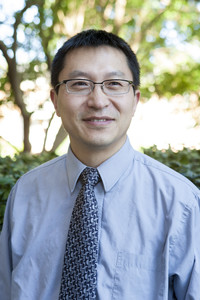
X. Robert Wang, PhD
Samford University
Professor
McWhorter School of Pharmacy
Department of Pharmaceutical, Social and Administrative Sciences
2235 CHS Building 2
Robert Wang joined the faculty in 2012 after seven years on the faculty at the University of Toledo College of Medicine and Life Sciences. He enjoys teaching and engaging with students and has mentored numerous PhD students, postdoctoral fellows, pharmacy students, and undergraduates in their research. His work has been supported by research grants from the National Institutes of Health, Cystic Fibrosis Foundation and American Heart Association. He is currently affiliated with the Gregory Fleming James Cystic Fibrosis Research Center of the University of Alabama at Birmingham. He appreciates Samford University’s Christian environment and is passionate about integrating classroom teaching with scientific discovery.Degrees and Certifications
- Postdoctoral Fellowship, The Scripps Research Institute, La Jolla, CA
- PhD, cell regulation, University of Texas Southwestern Medical Center
- MS, biochemistry, Baylor University
- BS, medical biology, Nankai University
Expertise
- cystic fibrosis, drug discovery, pharmacology, physiology, pharmacy education
Awards and Honors
- Post-doctoral Research Fellowship, Cystic Fibrosis Foundation
- Scientist Development Award, American Heart Association
- Faculty Member of the Year, Department of Pharmaceutical, Social and Administrative Sciences, McWhorter School of Pharmacy
Involvement
- American Association of Colleges of Pharmacy
- Association of Biochemistry Educators
- American Physiological Society
Selected Publications
- Ambrosetti A.D., Hagedorn Z.J., Bono T.R., Wen H., Nguyen R., Rodriguez-Cruz K., Ali J., Palacio H., Phillips A.J., Gilliland S.D., Freeman A.J., Thompson J., Fu L., McNicholas C.M., Rowe S.M., & Wang X.R. (2025). Lumacaftor inhibits channel activity of rescued F508del cystic fibrosis transmembrane conductance regulator. Am. J. Physiol. Lung Cell. Mol. Physiol., 328(6): L832-L843.
- Wang X.R., Cruthirds D.L., & Kendrach M.G. (2018). Effect of an individualized post-exam instructor remediation on pharmacy student performance in a biochemistry course, Am. J. Pharm. Educ., 82(6): 670-675.
- Heard A., Thompson J., Carver J., Bakey M., & Wang X.R. (2015). Targeting molecular chaperones for the treatment of cystic fibrosis: is it a viable approach? Curr. Drug Targets, 16(9): 968-974.
- Wang X.R., & Li C. (2014). Decoding F508del misfolding in cystic fibrosis. Biomolecules, 4(2): 498-509.
- Saxena A., Banasavadi-Siddegowda Y.K., Fan Y., Bhattacharya S., Roy G., Giovannucci D.R., Frizzell R.A., & Wang X. (2012). Human heat shock protein 105/110 kDa (Hsp105/110) regulates the biogenesis and quality control of misfolded cystic fibrosis transmembrane conductance regulator at multiple levels. J. Biol. Chem., 287(23): 19158-19170.
- Banasavadi-Siddegowda Y.K., Mai J., Fan Y., Bhattacharya S., Giovannucci D.R., Sanchez E.R., Fischer G., & Wang X. (2011). FKBP38 peptidylprolyl isomerase promotes the folding of cystic fibrosis transmembrane conductance regulator in the endoplasmic reticulum. J. Biol. Chem., 286(50): 43071-43080.
- Roy G., Chalfin E.M., Saxena A., & Wang X. (2010) Interplay between ER exit code and domain conformation in CFTR misprocessing and rescue. Mol. Biol. Cell 21(4): 597-609.
